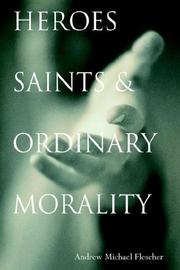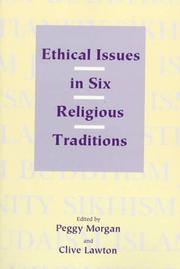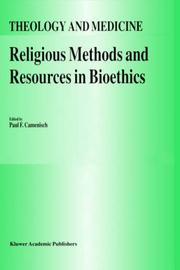| Listing 1 - 7 of 7 |
Sort by
|
Book
ISBN: 9782802801757 2802801759 2802803875 Year: 2007 Volume: 113 Publisher: Bruxelles FUSL
Abstract | Keywords | Export | Availability | Bookmark
 Loading...
Loading...Choose an application
- Reference Manager
- EndNote
- RefWorks (Direct export to RefWorks)
De l'autorité : personne aujourd'hui n'en ignore les crises et les bouleversements. Mais vouloir reproduire certains modèles du passé, dans l'espoir de « restaurer » l'autorité, a tôt fait de montrer ses limites. Les inclinations autoritaires penchent, on le sait, vers une pente dangereuse. Tout comme on sait ardus la tâche et les efforts d'innover en matière d'autorité. Entre le respect des limites et la nécessité des transgressions, la voie sur laquelle devenir humainement « auteur et répondant » de sa parole et de ses actes, envers soi-même comme envers autrui, n'est jamais tracée d'avance. Cette voie n'est pas étrangère à la foi, à son intelligence et à ses pratiques. Les croyant-e-s, leurs communautés et leurs institutions sont d'autant plus concerné-e-s qu'en la matière, l'autorité touche aux convictions profondes, aux manières de se référer à des textes fondateurs et des traditions, ainsi qu'aux rapports avec la société. Les études réunies dans ce volume se proposent d'en rendre compte, et d'en dégager quelques enjeux actuels, sous l'éclairage de l'histoire, de la philosophie et de la théologie. La perspective est donc pluridisciplinaire. Elle est aussi œcuménique, à la mesure de l'importance actuellement reconnue aux rapports entre autorité et dialogue, comme entre autonomie et obéissance. Traiter ces questions n'est pas faire « une » théologie de l'autorité, mais examiner les possibilités données à l'intelligence de la foi, pour qu'elle devienne auteure et répondante de ce qu'elle peut dire et faire dans le temps présent.
Christian theology --- Ethics [Religious ] --- Ethiek [Godsdienstige ] --- Ethique religieuse --- Godsdienstige ethiek --- Godsdienstige moraal --- Moraal [Godsdienstige ] --- Morale religieuse --- Religious ethics --- Authority --- Autorité --- Autorité --- Religious aspects --- Philosophy --- Religion --- autorité --- transgression --- foi --- pratique religieuse --- texte fondateur --- croyance --- autonomie --- obéissance --- dialogue --- doctrine
Book
ISBN: 9782873565091 2873565098 Year: 2011 Publisher: Namur Fidélité
Abstract | Keywords | Export | Availability | Bookmark
 Loading...
Loading...Choose an application
- Reference Manager
- EndNote
- RefWorks (Direct export to RefWorks)
Christelijke ethiek --- Christian ethics --- Christianisme--Morale --- Ethics [Religious ] --- Ethiek [Godsdienstige ] --- Ethique chrétienne --- Ethique religieuse --- Godsdienstige ethiek --- Godsdienstige moraal --- Moraal [Godsdienstige ] --- Moraaltheologie --- Moral theology --- Morale chrétienne --- Morale religieuse --- Religious ethics --- Theologie [Moraal] --- Theology [Moral ] --- Théologie morale
Book

ISBN: 2873740280 9782873740283 Year: 1995 Volume: *4 Publisher: Namur. : Artel,
Abstract | Keywords | Export | Availability | Bookmark
 Loading...
Loading...Choose an application
- Reference Manager
- EndNote
- RefWorks (Direct export to RefWorks)
Christelijke ethiek --- Christian ethics --- Christianisme--Morale --- Ethics --- Ethics [Religious ] --- Ethiek --- Ethiek [Godsdienstige ] --- Ethique --- Ethique chrétienne --- Ethique religieuse --- Godsdienstige ethiek --- Godsdienstige moraal --- Moraal [Godsdienstige ] --- Moraaltheologie --- Moral theology --- Morale chrétienne --- Morale religieuse --- Religious ethics --- Theologie [Moraal] --- Theology [Moral ] --- Théologie morale --- Theologie --- Théologie --- Congresses --- 241 --- Religions --- Ethical theology --- Theology, Ethical --- Theology, Moral --- Christian life --- Christian philosophy --- Moraaltheologie. Theologische ethiek --- Christian ethics - Congresses --- Religious ethics - Congresses
Book
ISBN: 9789042932876 9042932872 Year: 2016 Publisher: Leuven Peeters
Abstract | Keywords | Export | Availability | Bookmark
 Loading...
Loading...Choose an application
- Reference Manager
- EndNote
- RefWorks (Direct export to RefWorks)
Sexual experimentation, living together, raising children outside of marriage, remarriage after divorce, and same-sex relationships... These behaviours have become common in the wider society as well as among Christians and Catholic Christians. Not only do they think and act differently than the official Church teaching, but they do so convinced that they are acting rightly. This challenges ethics to respond by what can be called an 'ethics of mercy', by meeting people where they are and helping them to grow towards the fullness of life and love. Such a pastoral and educational ethics of growth should dare to stand within the tension between what is desirable and what is attainable, without surrendering the 'pro-vocative' idea of conjugal covenant as the basis for the family. Mercy is needed not only after ethics but in ethics. In harmony with Pope Francis's plea for a 'gospel of mercy', this book seeks a middle way between merciless rigourism and relativising subjectivism. It proposes an ethics of redemption that accompanies people on their way to meaningful living and loving, grounded in a spirituality that springs from the salvation offered in Jesus.
Barmhartigheid --- Behavior [Sexual ] --- Bonté miséricordieuse --- Chasteté --- Chastity --- Ethics --- Ethics [Religious ] --- Ethics [Sexual ] --- Ethiek --- Ethiek [Godsdienstige ] --- Ethique --- Ethique religieuse --- Ethique sexuelle --- Godsdienstige ethiek --- Godsdienstige moraal --- Kuisheid --- Mercy --- Miséricorde --- Moraal [Godsdienstige ] --- Morale religieuse --- Morale sexuelle --- Religious ethics --- Seksuele ethiek --- Sex--Moral and ethical aspects --- Sex--Moral and religious aspects --- Sexual ethics --- Sexualité--Aspect moral --- Moraal --- Fundementele moraal --- Algemeen

ISBN: 0878401377 Year: 2003 Volume: *1 Publisher: Washington (D.C.): Georgetown university press
Abstract | Keywords | Export | Availability | Bookmark
 Loading...
Loading...Choose an application
- Reference Manager
- EndNote
- RefWorks (Direct export to RefWorks)
Developpement moral --- Devoir --- Duty --- Ethics [Religious ] --- Ethiek [Godsdienstige ] --- Ethique religieuse --- Ethisch bewustzijn--Ontwikkeling --- Godsdienstige ethiek --- Godsdienstige moraal --- Goede werken [Overdadige ] --- Moraal [Godsdienstige ] --- Moral development --- Morale religieuse --- Moreel bewustzijn--Ontwikkeling --- Obligation --- Obligation morale --- Opera supererogativa --- Overdadige goede werken --- Overschrijden van zijn plicht --- Plicht --- Plicht [Overschrijden van zijn ] --- Religious ethics --- Sens moral--Développement --- Supererogation --- Surérogation --- Verplichting --- Zedelijke ontwikkeling --- Religions --- Ethical development --- Deontology --- Ethics --- Responsibility --- Child psychology --- Moral education --- Faith development

ISBN: 0748607099 9780748607099 Year: 1996 Publisher: Edinburgh Edinburgh university press
Abstract | Keywords | Export | Availability | Bookmark
 Loading...
Loading...Choose an application
- Reference Manager
- EndNote
- RefWorks (Direct export to RefWorks)
Religious ethics --- Religions. --- Comparative studies. --- Ethics --- Ethics [Religious ] --- Ethiek --- Ethiek [Godsdienstige ] --- Ethique --- Ethique religieuse --- Godsdienstige ethiek --- Godsdienstige moraal --- Moraal [Godsdienstige ] --- Morale religieuse --- 291.5 --- Religions --- -Comparative religion --- Denominations, Religious --- Religion, Comparative --- Religions, Comparative --- Religious denominations --- World religions --- Civilization --- Gods --- Religion --- 291.5 Godsdienstwetenschap: moraal; religieuze wet; zedelijk ideaal; religieuze plichten --- Godsdienstwetenschap: moraal; religieuze wet; zedelijk ideaal; religieuze plichten --- Comparative studies --- Comparative religion --- Religious ethics - Comparative studies. --- religion --- religious tradition --- religious ethics --- euthanasia --- marriage --- religious communities --- religious identity --- religious authority --- religious values

ISBN: 0792321022 9048142350 9401583625 Year: 1994 Volume: 2 Publisher: Dordrecht : : Kluwer Academic Publishers, ,
Abstract | Keywords | Export | Availability | Bookmark
 Loading...
Loading...Choose an application
- Reference Manager
- EndNote
- RefWorks (Direct export to RefWorks)
A volume on religious/theological methods in biomedical ethics inevitably of whether the methodological dimension can be distin- raises the question guished from the various other things that go on in ethical discourse. It is difficult to answer this question definitively since many elements in moral conversation can be interpreted in different ways. Barbara Hilkert Andolsen illustrates this issue in this volume when she defines one of her crucial cate- gories, gender justice, as being both procedural and substantive/normative. This difficulty of finally separating the methodological from the normative arises in many areas of contemporary ethical writing, both feminist and otherwise. Nevertheless, it seems that in many cases we can separate out the method- ological issues with considerable precision. Albert Jonsen and James Childress achieve just such a sharp focus in their essays. This does not mean that a careful dissecting of their papers would not reveal normative elements lurking about their methodological points. It is simply to say that the issues they analyze and the positions they take are, at least prima facie, overwhelmingly method- ological. They are much more about how we think about ethical matters than they are about what we think about them.
Bio-ethiek --- Bioethics --- Biologie humaine -- Morale et aspects éthiques --- Biology--Moral and ethical aspects --- Biomedical ethics --- Biomedische ethiek --- Biomédecine -- Morale et aspects éthiques --- Bioéthique --- Deontologie [Medische ] --- Deontology [Medical ] --- Déontologie médicale --- Ethics [Medical ] --- Ethics [Religious ] --- Ethiek [Godsdienstige ] --- Ethiek [Medische ] --- Ethiek in biologie --- Ethique en biologie --- Ethique médicale --- Ethique religieuse --- Godsdienstige ethiek --- Godsdienstige moraal --- Life sciences ethics --- Life sciences--Moral and ethical aspects --- Medical care -- Moral and ethical aspects --- Medical deontology --- Medical ethics --- Medicine -- Moral and ethical aspects --- Medische deontologie --- Medische ethiek --- Moraal [Godsdienstige ] --- Morale et médecine --- Morale médicale --- Morale religieuse --- Médecine -- Innovations -- Morale et aspects éthiques --- Médecine -- Morale et aspects éthiques --- Médecine et morale --- Politique sanitaire -- Morale et aspects éthiques --- Religious ethics --- Soins médicaux -- Morale et aspects éthiques --- Éthique clinique --- Ethics, Medical --- Religion and Medicine --- Bioéthique --- Ethique médicale --- essays. --- #GBIB:CBMER --- Religions --- Biology --- Life sciences --- Clinical ethics --- Health care ethics --- Medical care --- Medicine --- Ethics --- Moral and ethical aspects --- Professional ethics --- Nursing ethics --- Social medicine --- Science
| Listing 1 - 7 of 7 |
Sort by
|

 Search
Search Feedback
Feedback About UniCat
About UniCat  Help
Help News
News